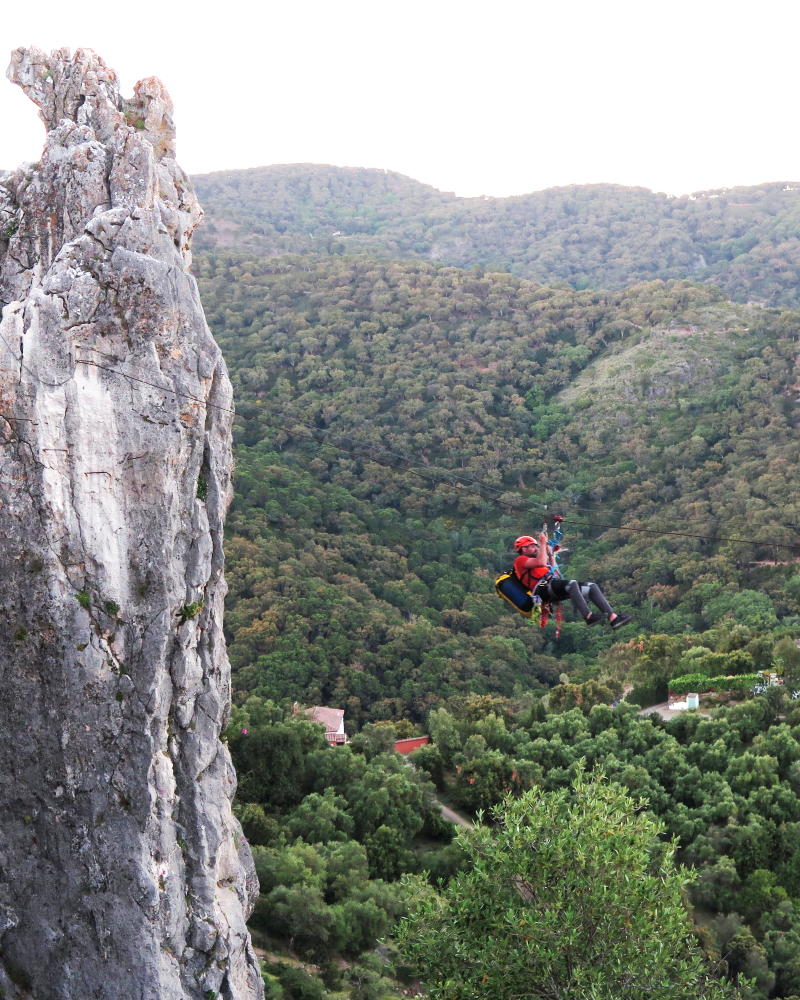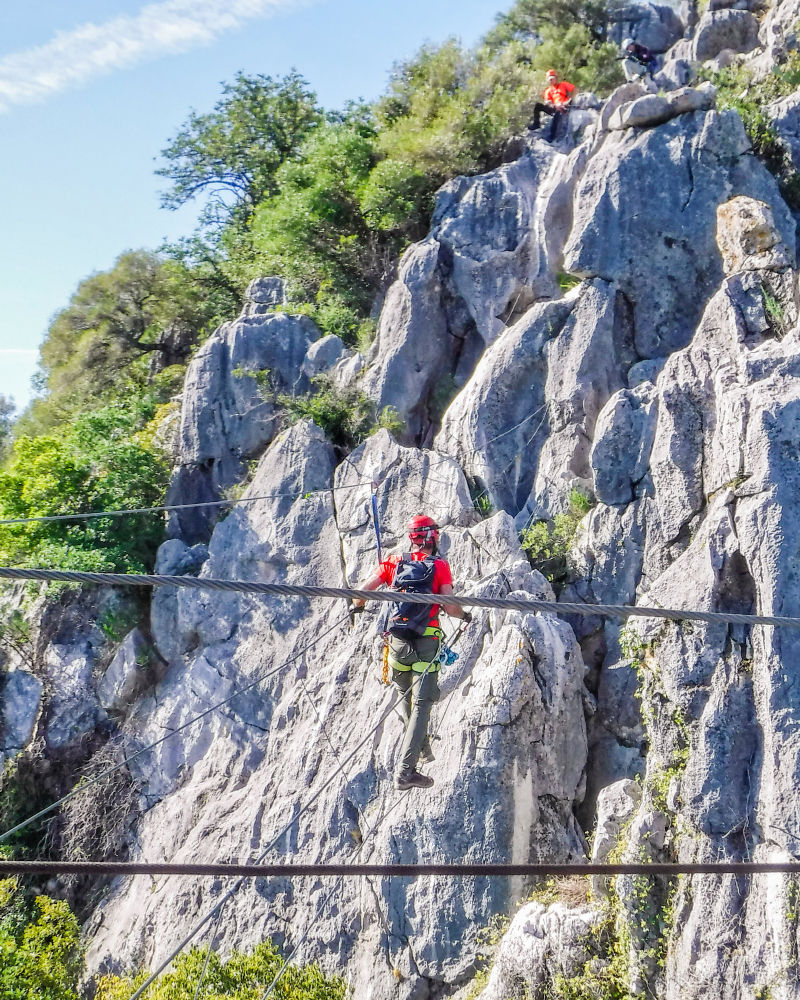VIAS FERRATAS
If you love sports and are an adrenalin junkie, Gaucin and the Vias Ferratas, or specially equipped climbing paths, offer you the best way to get your kicks. The Sierra del Hacho and Castillo del Aguila climbing paths are part of the Vías Ferratas park of the Serranía de Ronda, one of the most important in Spain.
A Via Ferrata consists of a succession of steps nailed into the rock which you climb in the same way as you would climb a ladder. Parallel to the steps runs a steel cable with independent anchor points called a lifeline to which the climber always remains secured. It is advisable to carry out this activity with qualified personnel who have prior knowledge of the type of route you want to explore, as well as the necessary equipment.

FERRATA DEL HACHO
TECHNICAL DETAILS:
Access time: 15 minutes
Route time: 1 hour 30 minutes
Return time: 30 minutes
Equipped length: 300 metres
Total length: 2.5 kilometres
Equipped elevation: 135 metres
Total elevation: 280 metres
Overhangs: 2
Ziplines: no
Ladders: 1
Condition: very good
READ MORE
The path is accessed from the road that links the village of El Colmenar (Gaucín Station) with the Algeciras-Ronda Road. At Puerto del Negro we turn off towards the Camino del Peso.
The peculiarity of this ferrata is a long cable ladder in the middle of the route, which makes it quite demanding both physically and technically. However, this point can be avoided using the bifurcation on the right side as an alternative route if it is too difficult to climb. The route is divided into two vertical sections, separated by a short descending traverse with loose terrain. Several horizontal sections and two gentle drops complete the course, with no bridges or ziplines. The route is more athletic than technical. Direct support on the rock is frequent. It is a route of moderate difficulty, globally classified as level K3, although it should be increased to high difficulty and level K4 if you opt for the ladder. Except for the climbing section, it is suitable for beginners. The equipment has corrugated clamps in very good condition, although the ladder cables do not maintain adequate tension. The protagonists of this route are its vertical slabs, with stunning panoramic views of the surroundings.
FERRATA CASTILLO DEL AGUILA
TECHNICAL DATA:
Access time: 5 minutes
Route time: 1 hour
Return time: 5 minutes
Equipped length: 182 metres
Total length: 800 metres
Equipped elevation: 39 metres
Total elevation: 47 metres
Overhangs: 2
Bridges: 2 Nepalese (with two cables) and 1 Tibetan (with three cables)
Zipline: 1
Condition: very good
READ MORE
It is located on the limestone walls surrounding the Castillo del Aguila, following a circular route.
The access point is at the entrance gate of the castle, located at the top of a promontory, and to which we ascend along a zigzagging cobbled path. The peculiarity of this ferrata, considered to be short but intense, is that it has a circular route, and the first half of the route is downhill, climbing uphill in the final stretch of the route. The route combines two vertical slabs with a 28m. drop, which is recovered in a third, final, stepped section. It also includes three horizontal sections with two gentle drops, two Nepalese bridges, a Tibetan bridge and a zipline.
The route is more technical than athletic. There are frequent direct holds on the rock, as well as support for the feet, as there are no clamps on some sections. In fact, the absence of clamps at the beginning indicates this requirement. It should be remembered that the lifeline is not designed to hold on to, so we would be cheating by using it as a handrail. This is a route of medium-high difficulty, globally classified as level K3.


VÍA FERRATA DEL CASTILLO DEL ÁGUILA
TECHNICAL DATA:
Access time: 5 minutes
Route time: 1 hour
Return time: 5 minutes
Equipped length: 182 metres
Total length: 800 metres
Equipped elevation: 39 metres
Total elevation: 47 metres
Overhangs: 2
Bridges: 2 Nepalese (with two cables) and 1 Tibetan (with three cables)
Zipline: 1
Condition: very good
READ MORE
It is located on the limestone walls surrounding the Castillo del Aguila, following a circular route.
The access point is at the entrance gate of the castle, located at the top of a promontory, and to which we ascend along a zigzagging cobbled path. The peculiarity of this ferrata, considered to be short but intense, is that it has a circular route, and the first half of the route is downhill, climbing uphill in the final stretch of the route. The route combines two vertical slabs with a 28m. drop, which is recovered in a third, final, stepped section. It also includes three horizontal sections with two gentle drops, two Nepalese bridges, a Tibetan bridge and a zipline.
The route is more technical than athletic. There are frequent direct holds on the rock, as well as support for the feet, as there are no clamps on some sections. In fact, the absence of clamps at the beginning indicates this requirement. It should be remembered that the lifeline is not designed to hold on to, so we would be cheating by using it as a handrail. This is a route of medium-high difficulty, globally classified as level K3.


